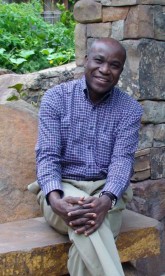
Journalism Under Fire
One Friday afternoon, we received what had become familiar visitors. They were soldiers from the military intelligence unit. We were used to visits from them and other security operatives, but this was different. A truck-load of troops, armed with automatic riffles and clad in battle fatigues literally overran our office premises. On arrival, the soldiers were deployed to the two main entrances to our office complex. No visitors were allowed in and persons within the offices were barred from leaving. A group then made straight for the newsroom. In a commando style operation, they took up positions in the newsroom, guns held ready for use. They marched to my office, but were informed by frightened staff that I was off duty for the day. Incensed by this, they stormed out of my office and headed for the office of our director. Threateningly, they ordered him to produce the editor who they believed was hiding somewhere. They were not convinced by his explanation that I was away for the day.
All this while, they did not state why they had come looking for [me]. They forced the director to take them to the press hall where they ordered that the printing machines should be turned off. Soldiers were left to watch over the press hall. They then returned to the offices, and insisted on taking the director, along with the chief executive officer and another senior executive to their base. On getting there, their commander announced the reason for the invasion of our premises. He said they were angered by a story in the day’s edition of The Guardian. The story, he added quickly, was accurate, but the headline was not a true representation of the body of the story.
The directors, relieved at last to hear that the complaint was only about the headline of a story, explained that newspaper headlines were written by different people from the writers and reporters of the stories. Besides, they promised to publish a correction in the next day’s edition of our newspaper. The commander, now feeling triumphant, obliged and allowed them to return to the office. He told them that we were also now free to continue with the day’s work. The ordeal was over, but it left a deep scar in the minds of all those who witnessed and experienced the wrath of the soldiers.
While they made a point with their show of force, a short rejoinder or a phone call would have resolved the matter as we are always willing to publish corrections where necessary. But the temperament of the times [in the early 1990s] did not permit a civilized form of reaction to a newspaper article. It demanded that the press be taught a very serious lesson on how not to misquote or rather misunderstand the director of military intelligence or any military officer for that matter. In the past five years, the press like all sectors of civil society was under siege by the military.
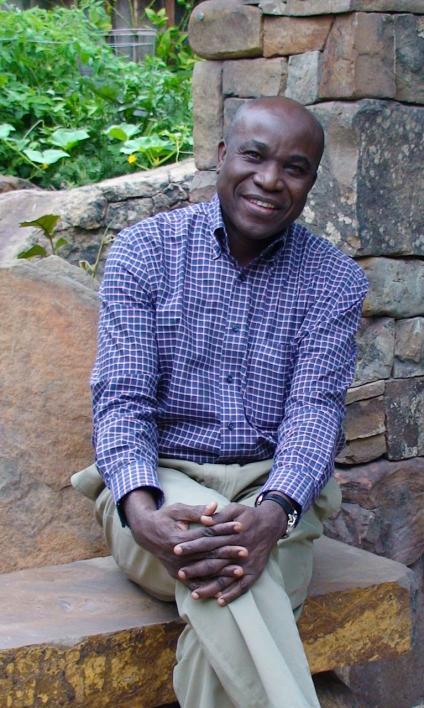
Izeze is the Managing Director and Editor-in-Chief for the Nigerian newspaper The Guardian. He has reported in Nigeria since the early 1980s.
This made an already difficult job, much worse. We walked a minefield of restrictive rules. There were, on one hand, the self-regulating codes generally recognized and honored by journalists. On the other hand, there was the mesh of governmental prescriptions and jackboot treatments that hamstrung journalists. For us, it was back to the jungle.
While government spokesmen boasted exuberantly of the freedom of the press in the country, they actually meant publications that were strictly within the limits of government tolerance. We were walking a tight rope. We could, of course, not mortgage ethical norms of truth, responsibility and objectivity. But the reality remained that we had to devise survival instincts. Quite infrequently, this dictated the way we played some stories, especially when we anticipated that using such stories prominently could break the tenuous official tolerance and incur a backlash from them.
Such repercussions in the past jeopardized our business, as happened when our newspaper was forcefully shut down for one year by the government. Our offence then, as it turned out, was not for any discernible misdemeanour other than that we were unfavorably disposed towards arbitrariness, corruption, [and] human rights abuse. We were also committed to the enthronement of democratic, transparent and accountable civil government freely elected by Nigerians. These were values that were not given vent by those in authority in the past five years.
But we recognized like Leonard Silk that our job transcended mere business, that “journalism is more than a business … (for) in the case of newspaper, the aim is not just making money, but is also essentially the same as the business of a university: truth seeking and truth telling.” But while the licence for the press in the free world is “publish and be damned“, for us it could translate to “publish and be hanged.” Journalists with no more than their forthright pens could be made to cool their impetuous heels in long detentions. Their wives and infants were on occasions, literally taken hostage by security agents. Some of them suffered vicarious arrests in the hands of the agents who came seeking the journalists in futile midnight raids.
[As expected], journalists were thrown to the front line of repression. Twice, [once in 1995 and once in 1997], some soldiers were dubiously arraigned for plotting to overthrow the military government. On each occasion, journalists were charged along with them. It was an unprecedented escalation of the persecution the press had ever experienced in the country. They were jailed for either being aware of the alleged plots or [for] being accessories after the event, that is, publishing stories that largely doubted the authenticity of the coup plots.
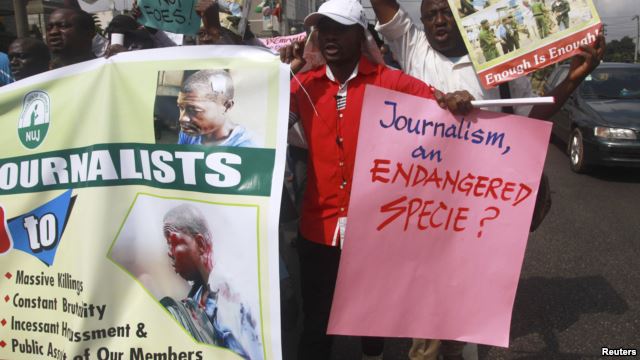
Roadside protesters after the assault of a local journalist in Lagos, Nigeria, in August 2012. Photo: Reuters.
But this did not stop the press from highlighting the excesses of the military government. Soon, at least two news magazine offices were taken over by the security agents. They resorted first to seizing copies of the magazines from both the printers and newsstands. Later, they started carting away the computers and other equipment used by the magazines in the vain hope that this would keep the publications out of business. When this failed, the offices of the magazines were sealed off with security agents taking permanent positions there. Still, the journalists were undaunted. They started operating underground. Reporters who worked in disguise would drop off stories in designated locations, from where they were picked up by editors who then produced the papers in various locations, often shifting bases every week, far from the prying eyes of the security agents.
The government was baffled that despite all its strong-arm tactics, the press remained defiant of its authoritarian rule. And so began indiscriminate arrests of journalists, especially in those magazines. Reporters and editors who were not held were driven into self-exile in Britain and the United States. (They have only just now started to return with the death of the former military dictator, General Sani Abacha). Besides, whole newspaper premises — even those hosting ancillary companies having nothing whatever to do with publishing — were sealed off for long seasons on the official charge of harboring catches of arms. No arms were ever found in any of those offices.
There was also a rash of subtle and blatant censorship regulations that were simply overwhelming. The government promulgated the Newspaper Registration Decree 43 of 1994. This made it mandatory for publishers to apply for registration under new provisions, which include the payment of huge sums as fees. By this law, registration was to be renewed yearly, but this was not automatic. The registration board, according to the law, would renew a licence only when it is satisfied with a newspaper’s conduct in the preceding year. Failure to secure renewal within six weeks of the expiration of the previous registration would warrant stopping further publication. The decree also stipulated that the Information Minister must be notified of the appointment of a newspaper editor and that publishers who violate the guidelines would be liable to huge fines or imprisonment of up to seven years, or both.
The remarkable thing about this law is that it was yet to be enforced by the government for the simple reason that no newspaper was willing to obey it. In other words, strictly enforcing the law could entail shutting down the entire industry, which publishes about 40 daily newspapers.
And while officials were chewing over this prospect, General Abaca, the head of state, died suddenly. A new leader, seemingly more humane and meek, took over. The new government has freed all political detainees including the journalists. It is unlikely now to proceed with the implementation of the law. It is also unlikely to go ahead with proposals for the inclusion of a National Mass Media Commission in the draft constitution as initiated by General Abaca as one of the ways of resolving the problem that he believed the press posed to his reign.
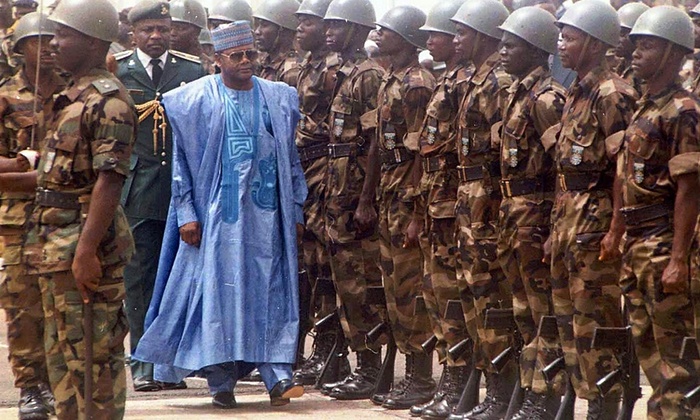
General Sani Abaca took power through a coup and governed over Nigeria from 1993 to 1998. Though Abaca accomplished much in reducing Nigeria’s external debt, he has been criticized for human rights violations within the country. Photo: James Fasuekoi/AP
The body was to further regulate the press and broadcast industries, in many ways, including prescribing professional and ethical standards and assisting proprietors in disseminating “lawful” information. And as if this was not enough, there was also a proposal for a press court solely to try alleged cases of professional misconduct by journalists. Then there is the highly dreaded State Security (Detention of Persons) Decree 2, under which all the journalists and other political detainees in the country were held. This particular decree permits the government to hold people without trial for an initial period of six months, renewable at the instance of the authorities. No court in the land can enquire into any action taken under this decree.
Many of these laws are now no more than paper tigers, not being strictly implemented. But the fact that some are still retained in the statute books means that they could be dusted up in the future and invoked whenever the government’s tolerance of the media snapped. Obviously, these measures could not have been dictated by any noticeable, inherent responsibility of the press. The fact is that responsibility is a norm dictated by self-preservation and the urge to defend the truth, to uphold all that is good, even in situations in which courage and truth could become suicidal indiscretions.
Are the ethics of truth, fairness and objectivity absolutely mortgaged then? I would say no, because where normative ethics stop is where Christian ethics begin. Spiritual commitment to truth, for instance, dares–even defies–the hazards of the social environment. The mundane licence to “publish and be damned” in the Western Society becomes for us the spiritual imperative of “publish in good conscience, and do so to the glory of God alone.”
Besides, we looked out for “Whatsoever things are true, whatsoever things are honest, whatsoever things are just, whatsoever things are pure, whatsoever things are lovely, whatsoever things are of good report; if there be any virtue and if there be any praise.” We uphold and defend them.
For us, scriptural prescription, more than the professional code, has become our operational guide. Good writing, for instance, does not allow for foul language, insults or abuses, especially as we are fully aware that some day, we would account for every idle or loose word we use. Yet, we find ourselves as Christian journalists in a dilemma. It is impossible for us to remain neutral in the face of so much abuse, brazen acts of wickedness, corruption and totalitarianism. For us, it becomes a matter of having good conscience, of defense of the truth, of belief in the goodness of humanity – and promoting it – of saying no to evil and paying the price for it. When I think of our situation this past five years, I recall the words of the Apostle Paul: “We are troubled on every side yet not distressed; we are perplexed but not in despair; persecuted but not forsaken; cast down but not destroyed.”
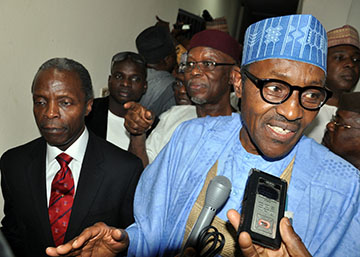
Censorship and detainment of journalists continues under current Nigerian President Muhammadu Buhari (R), Photo: AFP
The signs in the horizon may have brightened somewhat, especially since the death of the former military dictator, General Abaca. But we are not entirely taken in by it. We remain circumspect, recognizing that there is but a thin line separating a military government, any military government, from the temptation for highhandedness. Until the advent of democracy in our country, on May 29, 1999, we would go about our duty with measured risks. We would also remain dubious about the intentions of the military authorities. We would continue to push for the expansion of the frontiers of freedom, canvassing more openness, seeking the truth and telling it.
Izeze delivered this talk to a gathering of journalists in Hong Kong. He remains Managing Director and Editor-in-Chief of the Nigerian newspaper The Guardian.



Leave a Reply